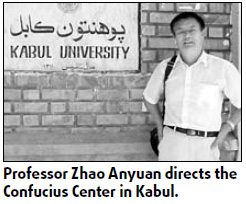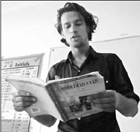Society
Afghan students get a taste of Chinese life
By Brendan Worrell (China Daily)
Updated: 2009-12-02 11:07
Though initially haphazard and ragged, in time the young Afghanis too begin to gel, punching and kicking the air in unison.
It's a process that seems to personify their determination and potential for triumph, once given the chance, some structure and training.
Aman's pal Shaheen says that after the four-year degree program, the group hopes to find work as translators or interpreters for the private or public sector.
Becoming a teacher and instructing others in Chinese is also another job option.
Aman, who speaks very good English he learnt from a Pakistani teacher in less than two years, says he hopes for more opportunities for Afghani students to be able to study and particularly to study abroad.
"I want to further my education so that my children can be educated, too."
Shaheen goes further, encapsulating the stark trauma of their predicament.
"The young people of Afghanistan want a country with a bright future. To have a country with a good name among other countries, not one that is infamous."
Taking Confucius to Kabul
While Aman and 12 others from Afghanistan learn Chinese in Taiyuan, Shanxi province, more students back in Kabul also have a chance to learn about Chinese culture with the opening of a Confucius Center on Nov 10.
Professor Zhao Anyuan, director of the Confucius Center in Kabul University, says a second and larger group of Afghani students chosen for a joint program between Kabul University and the Taiyuan University of Technology (TUT) is expected to arrive in Taiyuan early next year. They are currently learning Chinese from a Taiyuan instructor on the Kabul campus.

Zhao, also vice-dean of the College of International Education Exchange at TUT, says students will spend the first year in Kabul, the next two years at Taiyuan and the last year back home.
The joint program goes back to last January, when the Chinese and Afghani governments signed an agreement to commence a language program, thanks to an earlier conversation between Afghani President Hamid Karzai and his Chinese counterpart Hu Jintao.
In that conversation, Karzai expressed his desire for an institute to teach the Chinese language to be set up in his home country.
The Taiyuan university had been seeking, via the Ministry of Education's Hanban office, to link up with foreign campuses.
The first pilot Confucius program was established in Uzbekistan in 2004. By August this year, 356 Confucius Institutes had been set up in 84 countries and regions.
However, when the invitation came to team up with Kabul, staff at Taiyuan were slightly cautious, although in time they soon embraced the idea and the challenge.
As the pioneering teacher in Afghanistan, Wang Huangqing took a job few would consider. As a husband and father to a young child, he admits it wasn't an easy decision.
"I had never been abroad before and never had a chance to use the English language, which I majored in. The opportunity would make my dream come true."
In a country where the average life expectancy is less than 50 years and where over half the population cannot read or write, director Zhao says one of the biggest challenges is not so much the harsh living conditions as the security situation. He says this means it is hard to recruit people to work there as they think it is too dangerous.
Wang agrees: "People all over the world know that the situation in Afghanistan is worse than other places because of the war. So guaranteeing one's personal security was a big worry."
Zhao says each time he turns up in Kabul, the Chinese embassy frets over his safety. "They tell us not to go out with strange people, even those dressed in police and soldier uniforms - as they may be kidnappers in disguise."
But the ordinary Afghanis Zhao met are so friendly that it makes him forget about the war.
Wang says the people of Kabul and the students have also left him with good impressions.
"They have good manners and are very polite to teachers and among themselves. Those students are very smart and hard working."







